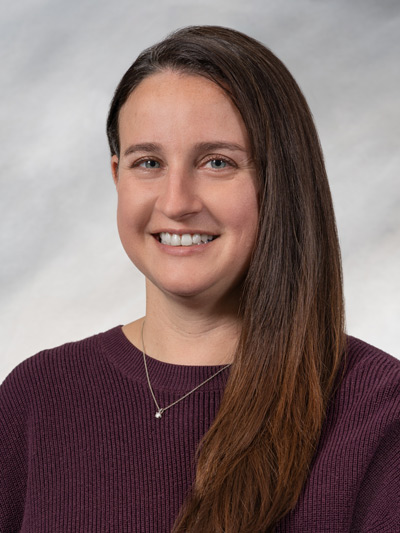A Wayne State University School of Medicine faculty member will participate in a national Doctors with Disabilities panel discussion this month.
Anne Messman, M.D., MHPE, FACEP, associate dean of Graduate Medical Education and designated institutional official for the School of Medicine, will be a member of the Dec. 12 panel discussion hosted by the University of Connecticut School of Medicine’s Disabilities Interest Group.
The panelists – five physicians and a medical student – will share their personal experiences with disability and chronic illness in medicine, accommodations and how to approach various obstacles during the virtual discussion, which begins at 6 p.m. For details and a link to the Zoom event, visit https://docs.google.com/forms/d/e/1FAIpQLSdgxKxn-JYTY6Yjt7gHFSe_lXqrWq_EqhScdMUJIYslmgaQGg/viewform
Dr. Messman, an associate professor of Emergency Medicine, has multiple sclerosis. In July 2023, she gave an interview in which she detailed the story of her diagnosis and how she handles the condition personally, and with the people with whom she works.

She has become an advocate for the recognition of disabled people in diversity, equity and inclusion efforts, talking publicly about her own disability while serving as a physician and administrator.
“I think we do a great job of recognizing gender, race, ethnicity and sexual orientation in diversity, equity and inclusion efforts, but we can improve on recognizing and understanding those with disabilities in DEI efforts,” Dr. Messman said in an earlier interview. “We need to make sure that folks with disabilities feel welcome and that there's no reason for them to hide their disability … they don't have to disclose it, but they should feel comfortable if that's the decision they want. A lot of times when we are talking now about DEI, I hear a lot about gender, sexual orientation, race and ethnicity, but very little about disability. I think people are starting to put it more at the front and center of DEI efforts, but just making sure that whenever a DEI effort is happening at any level … that at every important juncture it is emphasized that we welcome people of all types, and that includes people with disabilities. I think that message just needs to be reinforced over and over.”
Diagnosed with MS at the age of 16, Dr. Messman hid her disability, explaining that her limp was from a sports injury. She said that after years of hiding her condition, she now identifies openly as a person with a disability, and reveals her condition to the doctors, residents and physicians-in-training she encounters daily at the School of Medicine and emergency departments in which she works.
Dr. Messman joined the faculty in 2013. She served as the medical education fellowship director for the Department of Emergency Medicine, and previously served as the associate director of the Emergency Medicine Residency Program at Sinai-Grace Hospital. She also has served as the Emergency Medicine Residency Program assistant director at St. John Hospital and Medical Center, as well as the hospital’s director of rotating residents in the Department of Emergency Medicine.
Dr. Messman’s mother, also a physician, was diagnosed with MS when she was an Obstetrics and Gynecology resident at Northwestern University in the 1970s. She went on to successfully practice medicine for about 10 years before she became a full-time wheelchair user. She died in 2012 secondary to complications of her MS.
Raised in a family in which health issues were kept private, Dr. Messman said she was encouraged to do the same.
“When you're carrying a secret like that, it becomes very heavy and can become something like, ‘Well, why am I hiding this? It must be something I should be ashamed of or embarrassed of.’ I never wanted anyone to think that I had gotten where I'd gotten because of any sort of pity or anything like that,” she told podcaster Lisa Meeks, Ph.D., executive director of the Doctors With Disabilities Initiative in July. “So I held onto that secret for decades, actually, really until about 2020 or 2021. I had this sort of impossible goal for myself that I would only tell people when I had reached some sort of success. And my definition of success evolved over time. So at first, I thought, well, once I get into medical school, then I'll feel comfortable telling people because I’ve gotten in on my own merit.” She explained that once she got into medical school, that still did not feel enough of an accomplishment, so she set new goals, vowing to disclose her diagnosis when the next goal was met. This went on for 15 years, until she finally disclosed her diagnosis in 2021.
The outpouring of support once she disclosed her diagnosis and disability made her wonder why she kept the diagnosis private so long. “The great support leads to just feeling … more empowered and a little bit bolder and thinking, ‘Okay, I've told my story, but now in the position that I’m in, what positive things can I do to make sure that nobody else feels the way that I did, nobody else feels scared?’ It was very motivating to try to use my position to do better.
“I want to be an advocate, and I want to do more for the community of doctors that identify as disabled.” Dr. Messman said. “And I just am hungry to learn more because I know that there's more that I can be doing. I just don't know what it is. But I do feel empowered to not only learn more, but that I’m in a position where I could enact some of the changes that I'd like to see.”